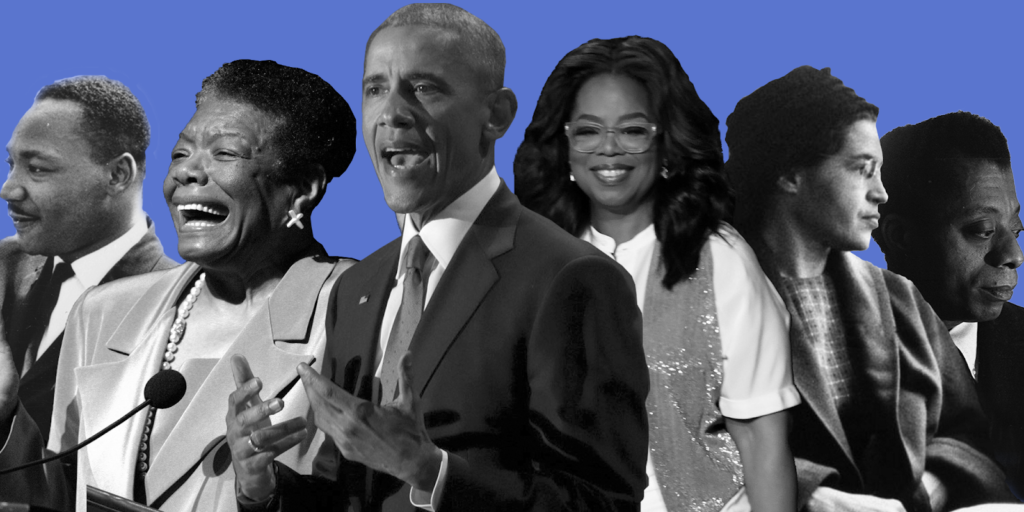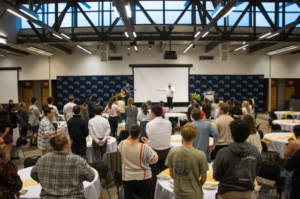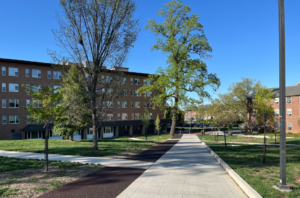Black History Month on Catholic University’s Campus

Image courtesy of Oprah Magazine
by Jacqueline Jedrych
Black History Month is celebrated every February to honor the history of challenges, accomplishments, and successes, as well as to highlight the culture of Black Americans. This month is important to millions across the nation and is equally important to the Catholic University community.
The second week in February was originally celebrated as Black History Week to honor the birthdays of Frederick Douglass on February 20 and Abraham Lincoln on February 12. The holiday has expanded to include the whole month and has grown from an American-based celebration to a worldwide observance.
The Black Student Alliance, Center for Cultural Engagement, History Department, and many other student and faculty organizations on Catholic University’s campus have planned a number of events to celebrate this month. This year, the Black Student Alliance has chosen the theme “Black &: Celebrating All We Are and All We Can Be.”
BSA Vice President Kelly Woodson says that planning the events in light of COVID-19 has been an obstacle.
“In the beginning, it was a huge challenge to be able to work around COVID,” Woodson said. “We have hosted all of our events in person in the past, especially Black & White Tie Affair, which is our huge BHM Gala.”
This month’s events will be held all online or hybrid in order to comply with COVID-19 guidelines on campus.
Throughout the month, Catholic U Leadership, in collaboration with the Black Student Alliance, will be hosting a Black History Month Art Showcase. Catholic University Leadership Assistant Director Antwann Harper is creating art pieces depicting Black and African American leaders of all ages and backgrounds while the staff creates Instagram posts highlighting various Black leaders from their communities and around the world.
On February 10, Dr. Shannen Dee Williams, author of forthcoming Subversive Habits: Black Catholic Nuns in the Long African-American Freedom Struggle and professor at Villanova University, gave a talk called: “The Real Sister Act: Why the Stories of U.S. Black Catholic Sisters Matter.” Dr. Williams highlighted the ties between the history of Black nuns and the Catholic dimension to the roots of African American freedom.
“I hope everyone who attends the event will gain a new understanding and interest in Black Catholic history, especially the history of Black Catholic women in the Church, which has been ignored and marginalized by scholars for too long,” said Dr. Julia Young, Associate Professor in the Department of History.
“Black & Mental Health Stigma” will be held February 15 in conjunction with the Counseling Center to discuss mental health issues and how to address their stigma in the Black community.
The Center for Cultural Engagement is hosting two Intercultural Dialogues this month; one on February 16 with Black Catholic University Alumni, and another on February 23 with Director of Blaq Italiano, Fred Kudjo Kuwornu. Blaq Italiano is a digital documentary about the stories of Black Italians in Italy and abroad.
“Black & Fashionable” on February 18 explains the intersection between Black history and fashion.
“Black is Poetic,” held in collaboration with George Washington’s Ubuntu, Howard Players, American University Black Student Alliance, and Georgetown Black Student Union on February 22, will feature live and pre-recorded poetry by Black students celebrating their heritage and culture.
Other events, such as an AfroBeats Dance class, “Black & Excellent: The Award Show,” and gaming nights offer a lighthearted and fun way to celebrate the Black experience as well.
For non-Black allies to help support their Black friends, CCE Director Javier Bustamante recommends taking advantage of these events to gain a deeper understanding of the history and culture of Black Americans.
“Building bridges is only done when we understand each other’s lived experiences, when we respect the foundations that make us unique and celebrate the richness that exists in our diversity,” Bustamante said.
Woodson encourages non-Black allies to attend all their events. “Coming to our events and being engaged in what we are discussing is extremely important,” Woodson said. “Also, it is important to follow, donate and give back to not only BSA but other Black organizations. It is important for the momentum to continue to go up.”
Harper also encourages allies to reach out in ways that are natural to them. “[I]f you are an artist, find out and look into various Black/African American artists and artists of color, especially up and coming artists,” Harper said. “Find ways in which you can spotlight their work and their voices. Find ways to start small!”
For more information about Black History Month and how you can get involved, the CCE has a page dedicated to resources for all students to help grow in their knowledge and understanding of Black history.








